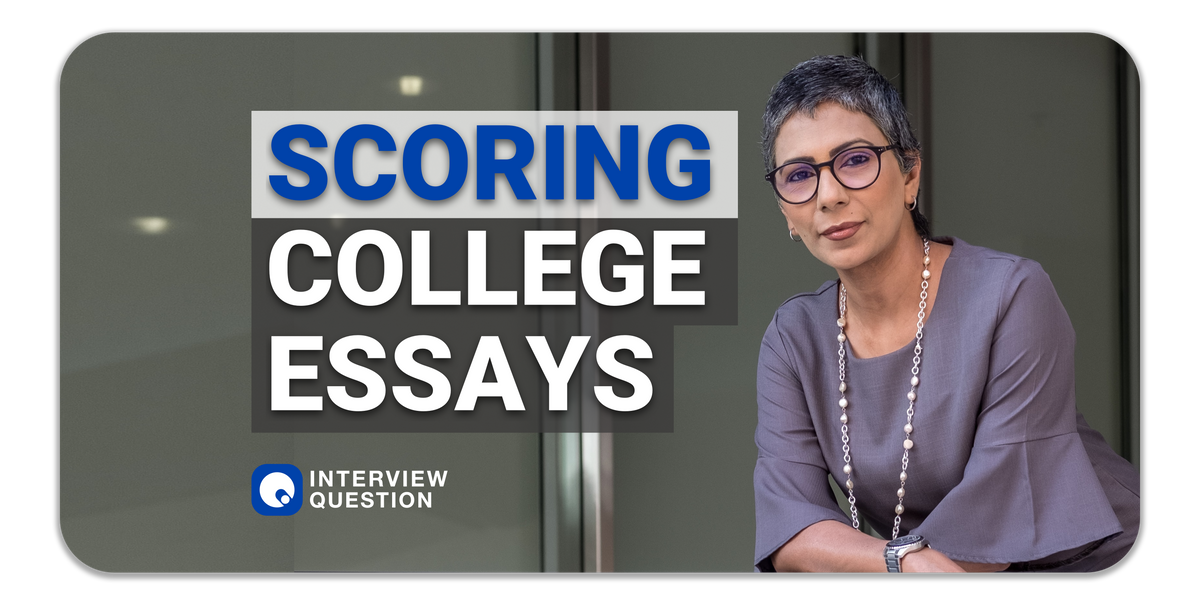How College Essays are Scored
• Outlining for College Essays • Assessment Criterion • Clarity • Opinion and Argument • Personality • Coherence • Authenticity • English Ability

Do you find it hard to write a college essay that will impress admissions officers and secure you an acceptance letter? Too often, students overlook the coherence (how well the content gels together) and have very bland, uninteresting content. If this sounds like you, we have some tips to share so you know what colleges look out for in your essay and this can help you write a great application essay with a high evaluation score.
Outlining for College Essays
When outlining your college essay, think about what you want to say, who you are, and why you should be accepted into the college. This is a good start because it forces you to get personal in your essay. Focus on telling a story rather than just describing something that happened.
Assessment Criteria for College Essays
Before delving into the thought processes behind writing a great essay, you need to know what the admissions officers are looking for. Every school is different, so it's important to understand what they're expecting.
Typically, your college essay will be scored on a scale from 1 to 100.
Criteria 1: Clarity
Applicants need to make sure that their writing is clear, concise, and free of confusion. This means that the admissions officers should be able to understand what you're trying to say without confusion. Additionally, it's important for the reader to understand how you feel about the topic and why you're writing about it.
Applicants need to make sure that their writing is clear, concise, and free of confusion. This means that the admissions officers should be able to understand what you're trying to say without confusion. Additionally, it's important for the reader to understand how you feel about the topic and why you're writing about it. Conciseness: See above, short words are better than long ones. Also, avoid using words that are too general or vague. Be specific!
See above, short words are better than long ones. Also, avoid using words that are too general or vague. Be specific!
Criteria 2: Opinion and Argument
You should be able to express your opinion and explain how you arrived at that opinion. This is about the "meat" of the essay. Describe the effect that your college plans will have on others (i.e., careers, communities, etc). Do your research and make sure your information is accurate. They may look for evidence of extracurricular activities or potential future contributions to society.
Refer to this resource for a sample of a good college essay.

Criteria 3: Personality
This is one of the hardest parts to write because you have to tailor your writing to show you in a positive light. Show that you have a unique or interesting background uncommon to most people. The individual personality you have is what will be most memorable, so make sure you incorporate that into your essay.
Your strengths and weaknesses you share are a part of who you are.

Criteria 4: Coherence
You want to have a fluidity to your writing where it moves well from one topic to the next. If you struggle with this, try reading aloud what you've written; if it sounds awkward or choppy, rewrite it.
When admissions officers look for something called "coherence", this means that the content of the essay needs to flow well together. They read essays from top to bottom, so make sure you don't proceed from one topic to another too quickly. Take your time with transitions and make sure your essay builds upon itself. Use transition words like "however," "furthermore," and "even though."
This is where you have to make sure that your essay isn't just random anecdotes, but has some structure and cohesion. This means that your sentences should flow logically from one to the next. Also, things like the "Title" and "Subtitle" sections should be relevant to the topic of the essay (it's okay if they aren't).
Criteria 5: Authenticity
The most important tip we have is to be authentic. Do your best, but don't try to impress the reader with how smart you are, or how cool you are. Make sure the story is true to your life (i.e., don't just make things up). If you don't have any opinion on the topic, just say that. This is subjective, so ask the admissions officer or interviewers for suggestions about what they think you should include. Being genuine and not withholding your emotions makes a great read.
Criteria 6: English Ability
The most obvious point out of all those mentioned is your command of the English language. There's no need to tell them that you're knowledgeable in the English language, they will see it for themselves.
Make sure your essay has proper structure (introduction, body, conclusion). You should have a thesis statement at the beginning of the first paragraph. After you finish writing your introduction, think back and check for anything that might be superfluous or doesn't add to your argument. Be careful not to use any spelling or grammar mistakes. Even if they're minor, they can make you look unprofessional and careless. Proofread.
Your application can be immediately put on the waitlist. Not all colleges grant interviews, so you may not even have the chance to talk to anyone regarding your application from the school.


